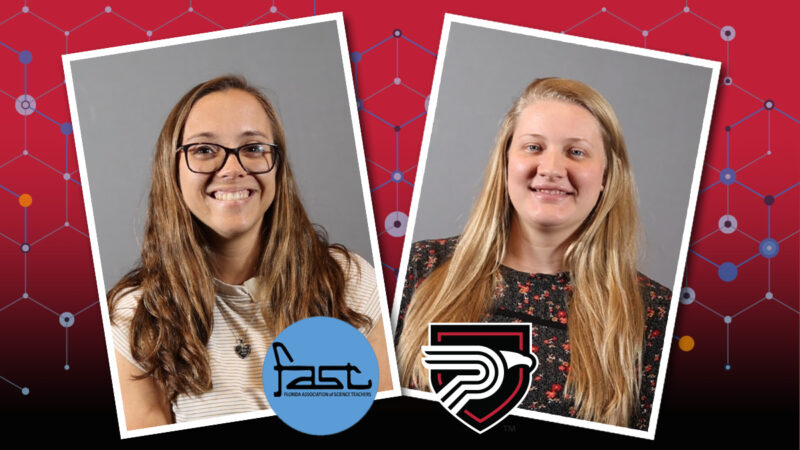Polk State Education students become published writers

Students in the Polk State College Education Program received the exciting news that their research and writing would be published in the Florida Association of Science Teachers Journal before they even graduated with their Bachelor of Science in Elementary Education degrees.
Katrina Beltran and Danielle Clifton co-authored “The Parent Advocate” with their Professor of STEM Education, Dr. Milton Huling. Beltran and Clifton graduated from Polk State in December and the article was published in the journal’s winter edition, which included “Why Writing in Science?” by Huling and “Multicultural Science Education for the English Language Learner” by Dr. Tony De Souza.
“It is a rarity for students at this level to publish,” Huling said. “I can’t even explain how proud I am of those two students. That fear of having to publish or perish is not as bad as it sounds. They are perfectly capable of doing that now on their own without my assistance.”
He shared that when he ended up with an independent study course with two students in the classroom, he saw an opportunity to encourage them to become researchers and writers.
“I thought it would be a great opportunity… to prompt them to seek out master’s degrees and eventually Ph.D.s because if they can get one article published they see that it is not this insurmountable task,” Huling said.
“To have my own work published means everything,” Clifton said. “It’s amazing that we were capable of getting published before we actually graduated.”
The article explores how parents can become better advocates for their children within the education system. It explains how many publications provide resources for teachers or parents “with time on their hands often determined by socioeconomic status” (i.e., parents with time to volunteer in the school), but not “for the average parent.”
This article focuses on science education as the authors’ research shows that this discipline is instrumental in the development of making choices in daily life and building citizenry.
A framework of questions is provided for parents to ask pertaining to their children’s science education so that they may receive information to best advocate for their children’s learning. This includes guidance on the content, quality, and quantity of instruction, as well as on student behavior, grades, and communication.
“Science is one of those things that you don’t have a lot of time for in education, but you have to make time for it. [Bringing science] to the forefront is something Dr. Huling is passionate about and something we are passionate about as well,” Beltran said.
“We see parents that are wanting to help their children and we are basically laying out a plan for a parent of what they should be doing,” Huling added.
Beltran and Clifton both expressed gratitude for the experience as well as for their professors who continue to support them in their new roles as teachers in Polk County Public Schools.
“My experience in the Polk State Education Program has been wonderful. My professors have been so helpful, so guiding,” Beltran said. “Even now as a teacher, they’re helping answer questions to help me along and to be better for my students.”
Individuals interested in Polk State’s Education Program are invited to an informational session on Monday, May 1, 2023, at 6 p.m. on the Polk State Lakeland Campus, and should RSVP here: https://forms.office.com/r/8vypknATi9. Polk State is proud to offer the Bachelor of Science in Elementary Education, the Bachelor of Science in Early Childhood Education, the Associate in Science in Early Childhood Education and Management, as well as the Educator Preparation Institute and other certificates. Opportunities such as publishing work and completing internships in Polk County schools are pivotal to the Polk State Education experience. More information is available at polk.edu/education.
The Florida Association of Science Teachers (FAST) is the state’s largest nonprofit professional organization dedicated to improving science education at all levels, from preschool through college. The association’s membership includes science teachers, science supervisors, administrators, and scientists. The FAST Journal is a peer-reviewed, practitioners’ journal that is published annually.

